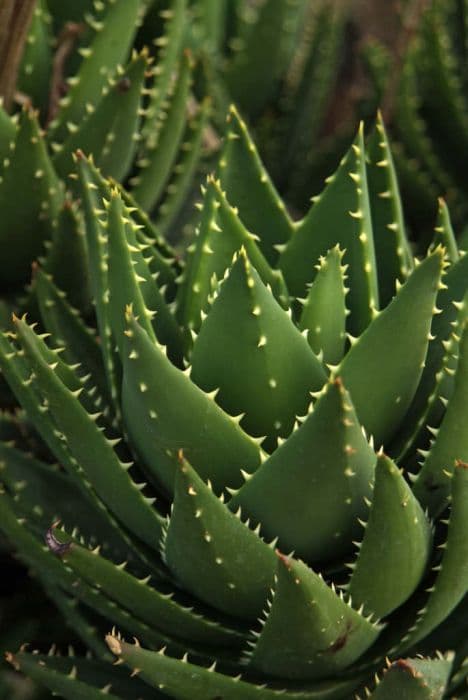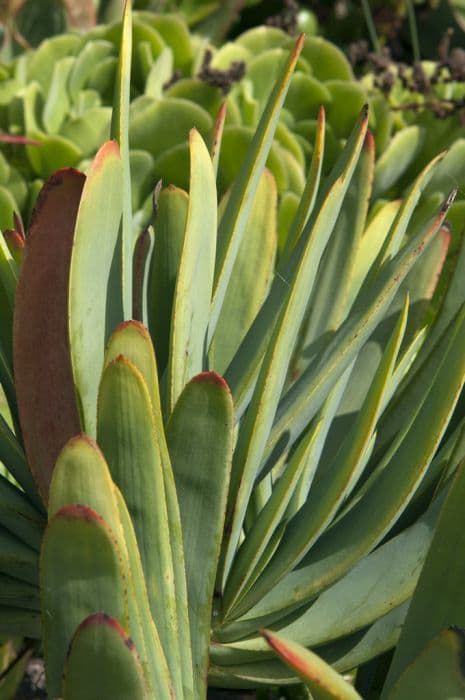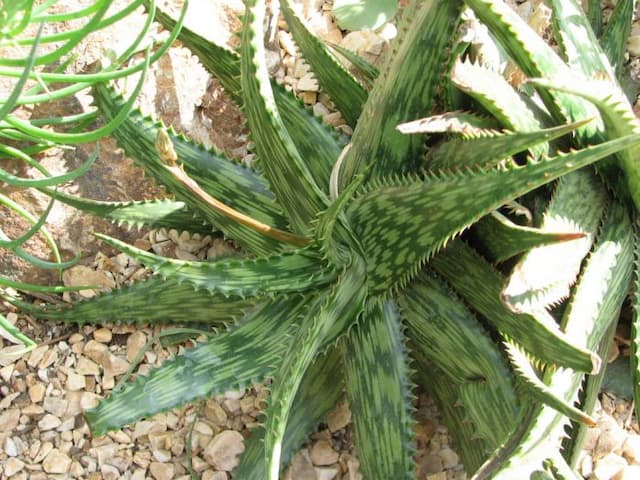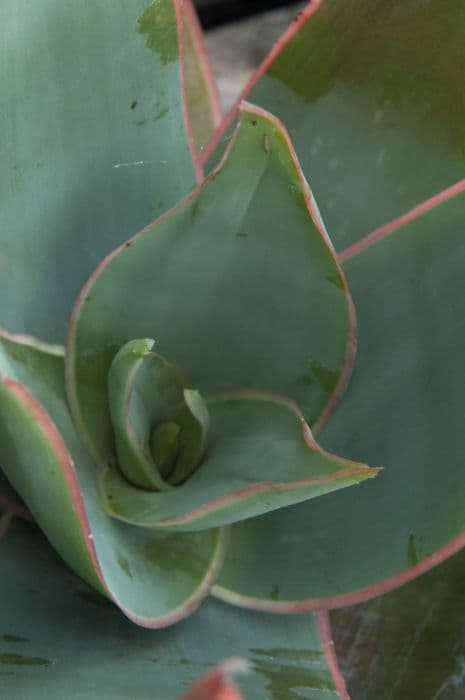Red Hot Poker Kniphofia 'Vanilla'

ABOUT
Kniphofia 'Vanilla', commonly known as Vanilla Red Hot Poker or Torch Lily, is a striking perennial plant. It is characterized by its unique flower spikes, which are composed of tubular florets. These blossoms are a creamy, vanilla white shade and are densely packed around each spike, resembling a glowing torch or a poker. The individual flowers are arranged in a gradation, starting with the buds at the top which usually show a light, greenish tint before they open up into the full vanilla white hue. The plant has a clump-forming habit, with long, slender, arching leaves. These leaves are a rich green color and are blade-like in shape, contributing to the plant's lush and grassy appearance at the base. During the blooming season, the spikes with clusters of vanilla-colored flowers stand out dramatically against the green foliage. The blooms not only provide a cool contrast to the often fiery shades seen in other varieties of Red Hot Poker but also attract pollinators such as hummingbirds and butterflies. After the blooming period, the flower spikes may fade and dry, becoming more tan or pale brown in color. However, the long-lasting nature of the flowers allows for an extended period of visual interest. Overall, the Vanilla Red Hot Poker offers both textural and color interest to gardens, making it a popular choice for borders, beds, and as a focal point in landscape designs.
About this plant
 Names
NamesFamily
Asphodelaceae
Synonyms
Red Hot Poker, Torch Lily, Tritoma
Common names
Kniphofia 'Vanilla'.
 Toxicity
ToxicityTo humans
Red hot poker is generally not considered toxic to humans. However, as with any plant, individual allergies or reactions could occur in sensitive individuals. If parts of the plant are ingested in large quantities, mild stomach discomfort may arise, but significant toxic effects are unusual.
To pets
Red hot poker is also not known to be toxic to pets. Nonetheless, ingestion could result in mild gastrointestinal upset, such as vomiting or diarrhea, due to the fiber and plant matter which is not part of their usual diet. Persistent symptoms would warrant a visit to the vet, as with any unexpected ingestion.
 Characteristics
CharacteristicsLife cycle
Perennials
Foliage type
Evergreen
Color of leaves
Green
Flower color
Vanilla
Height
3-4 feet (0.91-1.22 meters)
Spread
2-3 feet (0.61-0.91 meters)
Plant type
Herb
Hardiness zones
6
Native area
South Africa
Benefits
 General Benefits
General Benefits- Attracts Pollinators: Kniphofia 'Vanilla', commonly known as Red Hot Poker, is known to attract bees, hummingbirds, and butterflies, which are beneficial for pollination.
- Low Maintenance: This perennial plant requires minimal care once established, making it ideal for gardeners who prefer low-maintenance landscapes.
- Drought Tolerance: Red Hot Poker has good drought tolerance, making it suitable for xeriscaping or areas with water restrictions.
- Long Blooming Period: It produces blooms from late spring to early fall, offering a long season of visual interest.
- Deer Resistant: The plant is not favored by deer, reducing the likelihood of damage in areas with active deer populations.
- Architectural Interest: With its striking vertical form and bold flower spikes, Red Hot Poker adds architectural interest to garden designs.
- Variety of Uses: It can be used in mixed borders, as a focal point, in mass plantings, or in cottage and contemporary garden settings.
- Landscape Color: The creamy white blooms of 'Vanilla' add a soft contrast to the typical garden color palette.
- Soil Adaptability: It is adaptable to a range of soil types, though it prefers well-draining soils.
 Medical Properties
Medical PropertiesThis plant is not used for medical purposes.
 Air-purifying Qualities
Air-purifying QualitiesThis plant is not specifically known for air purifying qualities.
 Other Uses
Other Uses- Dye Production: The vibrant colors of Red Hot Poker flowers can be used for natural dye extraction, suitable for fabric and artisanal craft coloring.
- Garden Art: The striking form of Red Hot Poker plants can be utilized as a natural sculpture within garden design, providing aesthetic intrigue throughout the seasons.
- Photography: Due to its unique shape and color, Red Hot Poker can serve as an excellent subject for botanical photography and plant-based art projects.
- Educational Tool: The Red Hot Poker can be used in educational settings to teach plant biology, pollination, and horticulture techniques.
- Culinary Garnish: Although not commonly eaten, the flowers can occasionally be used as an ornamental garnish for specialty dishes in haute cuisine.
- Nectar Source: Red Hot Poker can be planted to serve as a nectar source for a home beekeeping setup, attracting bees and aiding in the production of honey.
- Companion Planting: Red Hot Poker can be used in companion planting to attract beneficial insects that prey on garden pests.
- Thermal Mass: The dense foliage of Red Hot Poker can add to the thermal mass in a garden, potentially influencing microclimate temperatures around other sensitive plants.
- Drama in Flower Arrangements: The bold and elongated structure of Red Hot Poker blooms can provide dramatic height and texture contrast in floral arrangements.
- Marker Plant: The height and distinctiveness of Red Hot Poker can make it useful as a marker plant to indicate where other, less visible plants are located in a large garden or field.
Interesting Facts
 Feng Shui
Feng ShuiRed Hot Poker is not used in Feng Shui practice.
 Zodiac Sign Compitability
Zodiac Sign CompitabilityRed Hot Poker is not used in astrology practice.
 Plant Symbolism
Plant Symbolism- Playfulness: Kniphofia 'Vanilla', commonly known as Red Hot Poker or Torch Lily, produces vibrant and striking flower spikes in shades that can range from vanilla to red hues. The bold and distinctive appearance of its flowers symbolizes playfulness, reflecting a sense of fun and whimsy.
- Standing Out: Owing to its unique flower formation and bright colors, Red Hot Poker is often associated with standing out or drawing attention, resembling an individual who easily stands out in a crowd with uniqueness or charisma.
- Attraction: The fascinating look of the Red Hot Poker acts as a magnet not only for human admiration but also for pollinators such as hummingbirds and bees, representing attraction and the power to draw others towards oneself.
- Strength: Red Hot Poker plants are known for their hardiness and ability to thrive in various challenging conditions, representing strength, resilience, and the ability to face and survive adversities.
 Water
WaterRed hot poker (Kniphofia 'Vanilla') should be watered thoroughly and deeply, allowing the water to penetrate the soil to encourage deep root growth. Aim to water the plant once a week, providing about 1 to 1.5 gallons for each plant, depending on the soil and climate conditions. During hotter, drier periods, you may need to water twice a week, whereas in cooler or rainy conditions, reduce the frequency. Ensure the soil is well-draining to prevent root rot. It's important to avoid overwatering, which can be as detrimental as underwatering.
 Light
LightRed hot poker thrives best in full sun conditions, meaning at least 6 hours of direct sunlight per day. The ideal spot for Kniphofia 'Vanilla' is in an open area where it's exposed to plenty of sunlight and not shaded by taller plants or structures. Partial sun is also acceptable, but the plant may not bloom as prolifically.
 Temperature
TemperatureRed hot poker prefers temperatures ranging from about 50 to 90 degrees Fahrenheit. It can survive temperatures as low as 20 degrees Fahrenheit but may need protection from prolonged freezes. Ideally, keep Kniphofia 'Vanilla' in a location where the temperature does not dip below 50 degrees Fahrenheit for extended periods to prevent damage to the plant.
 Pruning
PruningPrune red hot poker plants to remove spent flower stalks and to tidy up the plant. This will encourage a second bloom and prevent the plant from spending energy on seed production. The best time for pruning Kniphofia 'Vanilla' is in late summer or early fall, after it has finished blooming. Deadheading, or cutting back the flower stalks to the base, can be done as often as needed throughout the blooming season to maintain the plant's appearance.
 Cleaning
CleaningAs needed
 Soil
SoilThe Red Hot Poker requires well-draining soil, a mix of loam and sand or gravel with some organic matter is ideal. It prefers a soil pH ranging between 6.0 and 7.0. Ensure the soil is not too wet as this can lead to root rot.
 Repotting
RepottingRed Hot Pokers generally do not need frequent repotting and can thrive without being disturbed for several years. It's best to repot or divide these perennials every 3-5 years to maintain vigor and prevent overcrowding.
 Humidity & Misting
Humidity & MistingRed Hot Poker is tolerant of a wide range of humidity levels but does best in average humidity conditions that replicate its native South African environment. It does not require any special humidity considerations.
 Suitable locations
Suitable locationsIndoor
Ensure full sun, well-drained soil, and regular watering.
Outdoor
Plant in full sun, amend soil for drainage, water moderately.
Hardiness zone
5-9 USDA
 Life cycle
Life cycleKniphofia 'Vanilla', commonly known as Red Hot Poker or Torch Lily, begins its life cycle with seed germination, typically occurring in warm, moist soil conditions. The seedlings then develop into juvenile plants, producing a basal rosette of narrow, strap-like leaves. As the plant matures, it enters the vegetative stage, during which it experiences significant growth and establishes a strong root system to support future flowering. The adult plant reaches the reproductive stage, producing tall, erect flower spikes with tubular, creamy white to pale yellow florets that are pollinated by birds and insects. After pollination, seeds are produced and dispersed, completing the cycle. Throughout its life, Kniphofia 'Vanilla' undergoes seasonal cycles of growth and dormancy, with the leaves dying back in colder months and regrowing from the perennial rootstock in the spring.
 Propogation
PropogationPropogation time
Spring-early summer
The most popular method of propagating the Red Hot Poker, which is the common name for Kniphofia 'Vanilla', is by division. The best time to divide this perennial is in the spring or early fall when the plant is not in active bloom. To propagate by division, carefully lift the entire plant from the ground using a shovel or garden fork, ensuring as much of the root system as possible is intact. Gently shake or rinse off excess soil, then using a sharp knife or spade, divide the plant into smaller clumps, each containing several healthy shoots and a portion of the root system. Replant the divisions at the same depth they were originally growing, spacing them about 18 to 24 inches (approximately 45 to 60 centimeters) apart to allow for adequate air circulation and room for growth. Water thoroughly after planting to help establish the new divisions. This simple method helps to rejuvenate the plant and encourages vibrant flowering in the following seasons.









